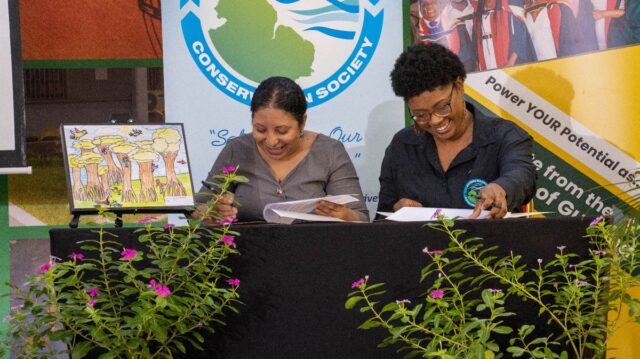
To bolster environmental research and education in Guyana, the University of Guyana (UG) and the Guyana Marine Conservation Society (GMCS) signed a Memorandum of Understanding (MoU) on Wednesday to leverage joint resources and expertise to tackle pressing environmental issues and promote sustainable practices across the nation.
The signing ceremony took place at UG’s Education Lecture Theatre (ELT) on the Turkeyen Campus, with a distinguished gathering that included officials from the United Nations Development Programme (UNDP), IDB Lab Guyana, European Union, Iwokrama, British High Commission, and other key stakeholders.
This latest partnership represents a significant step forward in enhancing local research efforts and fostering environmental awareness, particularly along the Barima-Mora Passage (BMP) coastline. It is notably supported by funding from the Inter-American Development Bank (IDB) Lab, underscoring the importance of such collaborative efforts in addressing environmental challenges.
Vice-Chancellor, Professor Paloma Mohamed Martin articulated UG’s commitment to environmental sustainability and climate resilience. “The University of Guyana is at the forefront of promoting sustainable environmental practices, biodiversity conservation, and climate change mitigation,” Professor Martin stated. “This MoU not only broadens our research capacity but also empowers our students to engage in vital research endeavors aimed at preserving our planet and ensuring a sustainable future.”
Guyana Standard understands that the MoU aims to enhance UG’s research capabilities, particularly benefiting students from the Faculty of Earth and Environmental Sciences (FEES) and the Faculty of Natural Sciences (FNS). These students will gain valuable opportunities to participate in impactful research projects that address critical environmental issues, thereby contributing to the global effort to combat climate change and promote biodiversity.
Dr. Marie Correia, Chairperson of the GMCS Board of Directors, highlighted the MoU’s role in facilitating local research initiatives and promoting broader environmental awareness. “This collaboration is aligned with the goals of World Environment Day, focusing on land restoration, desertification, and drought resilience,” Dr. Correia noted. “It provides a crucial platform for local researchers to contribute to the global environmental discourse and reinforces our commitment to sustainable development.”
The signing ceremony was a key feature of the GMCS’s Second Biannual Symposium, themed “Foundations of Sustainability: The People and Resources of the Barima-Mora Passage.” This symposium provided a platform for researchers to present their findings on a range of topics, from floral species abundance and wildlife monitoring to community involvement in mangrove conservation and advancements in mangrove monitoring technology. The presentations underscored the ecological significance of the BMP and highlighted the urgent need for concerted conservation efforts.
Lorena Salazar, speaking on behalf of IDB Lab in Guyana, emphasized the importance of preserving the Amazon rainforest and the need for comprehensive conservation strategies. “Interdisciplinary collaboration among governments, private sectors, and civil society organizations is crucial for protecting the Amazon’s biodiversity and promoting sustainable practices,” Ms. Salazar said. She noted that the partnership between UG and GMCS exemplifies the kind of collaborative approach necessary to address complex environmental challenges.
The symposium not only highlighted the environmental richness of the Barima-Mora Passage but also served as a reminder of the challenges facing these ecosystems. With topics ranging from species conservation to the impact of human activities on coastal regions, the event underscored the need for continued research and public awareness to ensure the sustainability of Guyana’s natural resources.












